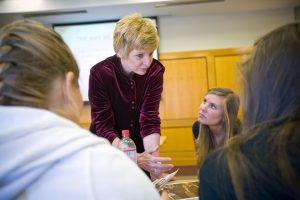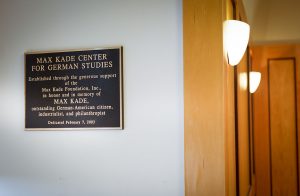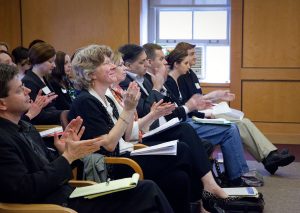Grant will fund new Max Kade House for German Studies and Visiting Scholars on McCartney Street
A $600,000 grant will help Lafayette establish a new Max Kade House for German Studies and Visiting Scholars near campus.
The grant from The Max Kade Foundation, a global advocate of German studies programs, will pay for the renovation and maintenance of 606 McCartney St., a spacious, stone residence in the College Hill neighborhood of Easton. The house, tentatively scheduled to open in fall 2017 will be administered by the Provost’s Office and will help support the College’s commitment to the study of German literature, language, philosophy, culture, and intellectual history.

Professor Margarete Lamb-Faffelberger teaches a course in the Max Kade Center.
“Our connection to Europe, working with our European friends and allies, is extremely important,” says Margarete Lamb-Faffelberger, professor of German and director of Lafayette’s Max Kade Center. “An institution of the distinction of Lafayette College is in a very good position to house a center that enables us to remember our strong ties to Europe and work toward the future.”
The College’s German program – one of the core offerings since it opened in the first half of the 19th century – operates out of a corner on the fourth floor of Pardee Hall. Since 2003, the roughly 130 students who enroll in German each year have benefited from the Max Kade Center, which features a wood-walled smart classroom and German-language-based programming. Funding came from a 50-50 matching grant with the Max Kade Foundation.
“It really has become the centerpiece of our space, our meeting, our intellectual curiosity and our workshops,” Lamb-Faffelberger says. A large percentage of German students can read advanced German texts and have a broad understanding of the culture, she says. “This is already a crème-de-la-crème that we have.”

The new Max Kade House will provide living quarters for the visiting Max Kade Writer/Artist-in-Residence, expanding the opportunities for attracting visiting lecturers and extending their stays on campus.
Part of what makes our German program so successful, Lamb-Faffelberger says, are the visiting artists and writers she scours the globe to choose — in typical Lafayette fashion — from across disciplines. Visiting writers and artists are poets and novelists, but also engineers and scientists. In spring 2016, Dimitré Dinev, a famous Bulgarian-born, Austrian author, poet, and screenwriter, spent the semester on campus working with students on their creative writing projects.

The Max Kade Center hosted an Undergraduate Research Conference in German Studies in 2012.
The Max Kade House complements the recently opened Oechsle Center for Global Education, a three-story home to the international affairs and Africana studies programs and the anthropology and sociology department; as well as the Grossman House for Global Perspectives.
Lafayette has a long tradition of advancing German studies, crucial to the region’s rich German heritage and tradition. The teaching of the German language was mandated by the College’s founding charter in 1826 and it has remained an integral part of the humanities curriculum at the College.
Founded by the entrepreneur and German cultural champion for which it was named, the Max Kade Foundation supports initiatives which promote international understanding by sponsoring exchange programs between Germany, Austria, and the U.S., such as post-doctoral research exchange programs, visiting faculty exchange programs, and exchange programs of undergraduate and graduate students both here and abroad. The foundation provides $17,500 annually for German studies programs and the Max Kade Visiting Writer/Artist in Residence program.
Lafayette’s Max Kade House will join similar houses in Pennsylvania located at Allegheny College, Penn State University, and Dickinson College.


